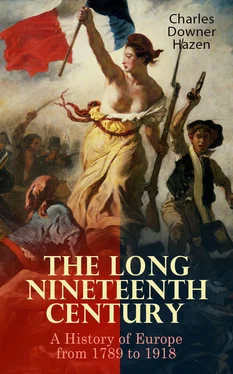On the other hand, the lower clergy, the thousands of parish priests, who did the real work of spiritual consolation and instruction, who labored faithfully in the vineyard, were wretchedly recompensed. They were sons of the third estate, while their proud and prosperous superiors were sons of the nobility, and they were treated as plebeians. With wretched incomes of a few hundred francs, they had difficulty in keeping body and soul together. No wonder they were discontented and indignant, exclaiming that their lot "made the very stones and beams of their miserable dwellings cry aloud." No wonder they were bitter against their superiors, who neglected and exploited them with equal indifference. The privileged order of the clergy is thus seen to be divided into two classes, widely dissimilar in position, in origin, and in outlook upon life. The parish priests came from the people, experienced the hardships and sufferings of the people, saw the injustice of the existing system, and sympathized with plans for its reform. The triumph of the popular cause in the Revolution was powerfully aided by the lower clergy, who at critical moments threw in their lot with the third estate and against their clerical superiors who rallied to the support of the absolute monarchy which had been so indulgent and so lavish to them. A house divided against itself, however, cannot permanently stand.
Somewhat similar was the situation of the second order, the nobility. As in the case of the clergy, there was here also great variety of condition among the members of this order, although all were privileged. There were several subdivisions, clearly enough marked. There were two main classes, the nobility of the sword and the nobility of the robe, that is, the old military nobility of feudal origin and the new judicial nobility, which secured its rank from the judicial offices its members held. The nobility of the sword consisted of the nobles of the court and of the nobles of the provinces. The former were few in number, perhaps a thousand, but they shone with peculiar brilliancy, for they were the ones who lived in Versailles, danced attendance upon the king, vied with each other in an eager competition for appointments in the army and navy and diplomatic service, for pensions and largesses from the royal bounty. These they needed, as they lived in a luxurious splendor that taxed their incomes and overtaxed them. Residing at court, they allowed their estates to be administered by bailiffs or stewards, who exacted all that they could get from the peasantry who cultivated them. Everybody was jealous of the nobles nobles of this class, for they were the favored few, who practically monopolized all the pleasant places in the sun.
The contrast was striking between them and the hundred thousand provincial nobles who for various reasons did not live at court, were not known to the king, received no favors, and who yet were conscious that in purity of blood, in honorableness of descent and tradition, they were the equals or superiors of those who crowded about the monarch's person. Many of them had small incomes, some pitifully small. They could cut no figure in the world of society, they had few chances to increase their prosperity, which, in fact, tended steadily to decrease. Their sons were trained for the army, the only noble profession, but could never hope to rise very high because all the major appointments went to the assiduous suitors of the clique at court. They resided among the peasants and in some cases were hardly distinguishable from them, except that they insisted upon maintaining the tradition of their class, their badge of superiority, a life of leisure. To work was to lose caste. This obliged many of them to insist rigorously upon the payment of the various feudal dues owed them by the peasantry, some of which were burdensome, most of which were irritating. In some parts of France, however, as in the Vendee and in Brittany they were sympathetic and helpful in their relations with the peasants and were in turn respected by them.
The nobility as a whole enjoyed one privilege that was a serious and unnecessary injury to the peasants, making harder the conditions of their lives, always hard enough, namely the exclusive right of hunting, considered the chief noble sport. This meant in actual practice that the peasants might not disturb the game, although the game was destroying their crops. This was an unmitigated abuse, universally execrated by them.
The odium that came to be attached in men's minds to the nobility was chiefly felt only for the selfish and greedy minority. The provincial nobility, like the lower clergy, were themselves discontented with the existing order, for abundant reasons. They might not wish a sweeping transformation of society, but they were disposed to favor political reforms that would at least give all within the order an approximately equal chance. They were devoted to the king, but they experienced in their own persons the evils of an arbitrary and capricious government which was highly partial in its favors.
There was yet another section of the nobility whose status and whose outlook were different still. Many offices in France could be bought. They and their perquisites became the property of those who purchased them and who could transmit them to their children, and one of the perquisites that such offices carried was a patent of nobility. This was the created nobility, the nobility of the robe, so called because its most conspicuous members were the judges, or members of the higher tribunals or parlements. These judges appeared, in one aspect, as liberals in that as lawyers they opposed certain unpopular innovations attempted by the king. But in reality as soon as their own privileges were threatened they became the stiffest of defenders of many of the most odious abuses of the Old Regime. In the opening days of the Revolution the third estate found no more bitter opponents than these ennobled judges.
Such were the two privileged orders. The rest of the population comprising the vast majority of the people, was called the third estate. Differing from the others in that it was unprivileged, it resembled them in that it illustrated the principle of inequality, as did they. There were the widest extremes in social and economic conditions. Every one who was not a noble or a clergyman was a member of the third estate, the richest banker, the most illustrious man of letters, the poorest peasant, the beggar in the streets. Not at all homogeneous, the three chief divisions of this immense mass were the bourgeoisie, the artisans, and the peasants.
The bourgeoisie, or upper middle class, comprised all those who were not manual laborers. Thus lawyers, physicians, teachers, literary men, were bourgeois: also merchants, bankers, manufacturers. Despite great national reverses, the bourgeoisie had grown richer during the past century as commerce had greatly increased. This economic growth had benefited the bourgeosie almost exclusively and many large fortunes had been built up and the general level of material welfare had been distinctly raised. These were the practical business men who loaned money to the state and who were frequently appointed to offices where business ability was required. Intelligent, energetic, educated, and well-to-do, this class resented most keenly the existing system. For they were made to feel in numerous galling ways their social inferiority, and, conscious that they were quite as well educated, quite as well mannered as the nobles, they returned the disdain of the latter with envy and hatred. Having loaned immense sums to the state, they were increasingly apprehensive, as they saw it verging rapidly toward bankruptcy, because their interests were greatly imperiled. They favored therefore a political reorganization which should enable them to participate in government, to control its expenditures, to assure its solvency, that thus they might be certain of their interest and principal; that thus abuses which impeded or injured business might be redressed, and that the precariousness of their position might be remedied.
Читать дальше












